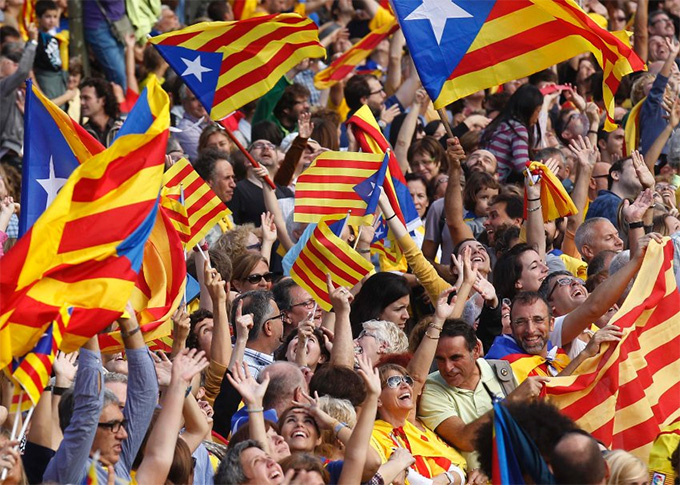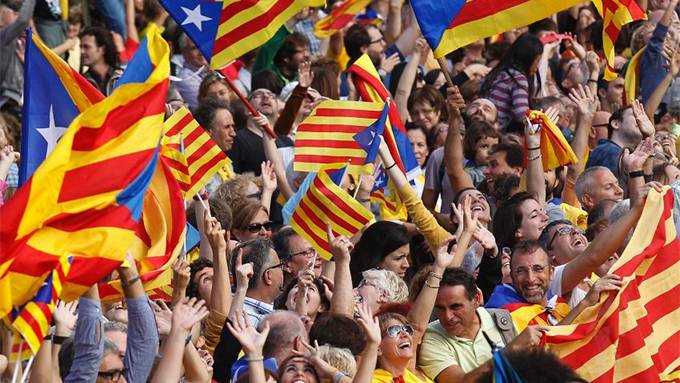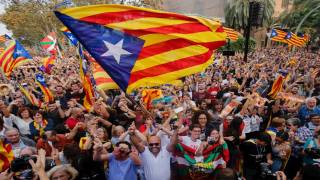Catalonia Votes for Independence, A Massive Act of Disobedience
Source: counter-currents.com

On Sunday, the 9th of November (9N), an Independence Referendum was held in Catalonia. The poll has resulted in more than 2,300,000 votes cast. The results break down as follows.
Yes to independence: 80.76% (1,861,753 votes)In this Referendum, unlike the Scottish referendum, there was a third option, a federal vote (“Yes/No” option) besides the “Yes” or “No” options.
Federal option for a Catalan State within Spain (Yes/No option): 10.07% (232,182 votes)
No to Independence: 4.54% (104,772 votes)
The remaining 4% (approx.) of votes were blank or invalid. The total exact figure was 2,305,290 votes cast.
As for participation, if we consider the 2014 European Election census of 5,318,296 (there was no official census because of the ban from the Spanish government), we can get an idea of how many voters approached the polling stations. In the European elections, held in June, participation was 47.63% (2,532,629 votes cast). Participation has been indeed far from the Scottish referendum, which got a figure higher than 80% of eligible voters. The fact that the referendum was not sanctioned by the Spanish government probably had an impact on the participation rate.
Since the referendum was banned, there was no permission to use the usual polling stations (schools). High schools were used instead, resulting in a very low number of polling stations (1,317, instead of almost three times as much that in normal elections). Ian Duncan, MEP for the British Conservative Party and spokesperson for the International Observers Delegation said in this regard: “the limitation in the number of Polling Stations has indeed influenced, and so have the adverse political circumstances. Nevertheless, I think that the process has been a success”
The “Yes” option has attracted far more votes than the federal (“Yes/No”) or “No” options. The great disproportion can be explained by many different factors. On the one hand, it’s not difficult to imagine that many people, even some people in favor of an independent Catalan state, have probably been discouraged from voting, given the unofficial and thus non-binding status of the referendum. On the other hand, there has been an obvious boycott followed by most of those opposing Catalan independence and the right to self-determination.
[...]
Consequences and Possible Next Steps
Many political analysts have pointed out that, beyond the massive turnout, it’s been significant that the Spanish Government, despite all the resources at hand (police, army, administration, economic power, state owned media) and also despite the suspension coming from the Spanish High Court, could not stop the referendum from taking place. It certainly wasn’t able to prevent millions of Catalans from going to the polling stations.
Again, we have to take the following into account. No official polling stations were open. The polling stations were manned by volunteers (40,000, with the backing of the Catalan government) rather than officials. Also, one should not underestimate the fear of the common citizen to take part in something that was being constantly publicized as “illegal.” Thus, we can state that the referendum was a massive act of disobedience.
Participation was far greater than the one million figure expected by the organizers. This makes this “informal” referendum a political act of utmost importance. Indeed, as a result a new political crisis is brewing in Spain, with the Prime Minister, Mr. Mariano Rajoy, in its center. The Spanish Prime Minister is well-known for sweeping problems under the carpet. But this time it seems that the problem is simply growing so big that many believe that he’s definitively dug his own political grave.
In the coming weeks the Catalan government could announce an election in the form of a plebiscite in case the Spanish government continues to block an official referendum.
Read the rest: counter-currents.com






















